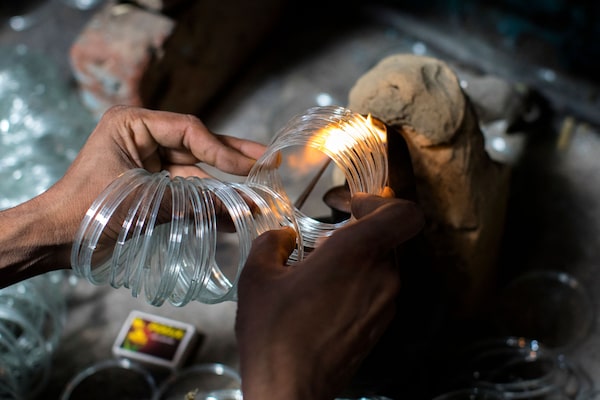
A worker makes glass bangles at a home workshop in the Indian industrial town of Firozabad.XAVIER GALIANA/AFP/Getty Images
Pinky Devi, 30, remembers feeling helpless as her husband would come home drunk every evening, picking a fight and throwing the dinner to the ground.
Now, Ms. Devi has found a way to take some control over the power of alcohol. In the village of Sabalpur, located 20 kilometres outside of Patna, the capital of the eastern state of Bihar, she is one of two dozen women in her village who have been employed at a new factory that turns liquor bottles into an essential accessory for women in Bihar: bangles.
Roughly a hundred other women are in the process of being trained in this state-run project, known as JEEViKA (which translates as source of livelihood). The initiative is part of the World Bank-financed rural livelihoods program in Bihar, which started in 2006. The bangles factory was inaugurated in November and became fully operational last month.
“Bangles symbolize prosperity and good luck, and no married woman is seen without them. Liquor bottles once meant torture for us as almost every home had an alcoholic, draining us emotionally and financially, but now we are able to do something useful with them,” said Ms. Devi, whose husband has changed his drinking habits.
Bihar is one of the five Indian states where liquor is prohibited, a controversial policy that came into force in 2016, supported by rural women who have led a movement against alcoholism and domestic violence in Bihar for years. But the illicit sale of liquor has continued, and excise officials seize close to 200,000 bottles a month, according to government estimates.

Women work at the bangle manufacturing unit in Sabalpur village in the state of Bihar, which is one of five Indian states where liquor is prohibited. The policy, which came into force in 2016, was supported by rural women concerned about the connection between alcohol and abuse.JEEViKA
The prohibition financially affected many households who were in the liquor business. Committees of local women were set up to help them find alternative livelihoods.
“The excise department regularly seizes liquor bottles that are dumped here and there. So we thought, how can we turn it into a livelihood opportunity? Can we convert the rich raw material of glass into something useful? That’s where the idea sprang from,” said Mahua Roy Choudhury, program co-ordinator, governance and knowledge management, at JEEViKA.
It made business sense, she said, with a “huge captive market for glass bangles in Bihar year-round” – women tend to wear different bangles to match the season, occasion and the colour of their saris.
There was another gap to fill. “Bihar has few glass bangles manufacturing units. So far, we had been getting them from other states such as Uttar Pradesh. For the first time, women are making bangles in Bihar,” explained Ms. Choudhury.

Women buy bangles at a bangle stall in Firozabad. Bangles are viewed as symbols of prosperity and good luck in India and are favoured by married women.XAVIER GALIANA/AFP/Getty Images
Experts from Uttar Pradesh were brought in to train them. The products will be sold at rural markets and on e-commerce sites. The factory is fitted with three gas-operated furnaces that can make 80,000 bangles a day.
On a warm February morning, when the unit became fully operational, a group of women in orange vests and yellow safety helmets secured over their brightly coloured saris sat hunched over bunches of freshly made white glass bangles. The furnaces crackled; thousands more were baking.
“It’s hard to believe we made these. This is our first time stepping out of the home to work. It is challenging to work with glass but we are gaining confidence,” said Ms. Devi, mother of four children. “This manufacturing unit is unique because it is largely made up of women. In all other factories in this area, there are too few jobs for women. My family was supportive as it is close to my house,” she said.

Women sort out glass bangles at their home in Firozabad.XAVIER GALIANA/AFP/Getty Images
Bihar has just 9.4-per-cent female participation in the labour force, against a national average of 28.7. This employment initiative for women – with the plan to set up five more such units in the state this year – is one of many trying to help people improve their lives and offer new opportunities.
Women comprise 70 per cent of the work force at the factory, and they come from a cluster of nearby villages. The rest is made up of male staff who do the major furnace work.
“With this factory, we are trying to set new standards in working conditions for women,” said Amit Vaibhav, who is part of the JEEViKA program and helped set up the factory. “In other industries, work timings can be brutal, the salary very low. Here, they get a safe environment. Many have never worked before, so there was a learning curve, but they were enthusiastic about the idea,” he said. The women are paid roughly 7,000-8,000 Indian rupees ($115-$132) a month.
Gunja Devi, 29, (no relation to Pinky) was one of the first employees. “I was married at 16, had three children, and never thought I would work outside the house. But now my life has changed. I am proud that I don’t have to be financially dependent anymore. I can pay for my children’s education, plan a better future for them and bring in a second income,” she said.
As the day draws to a close at 5 p.m., the women gather to admire the fruits of labour. A day of crushing glass bottles, melting, shaping, dyeing and decorating has resulted in shiny, perfectly round bangles. “They may be just bangles,” said Gunja Devi, her own orange bangles tinkling on her wrists, “but they have given us a deep sense of empowerment.”